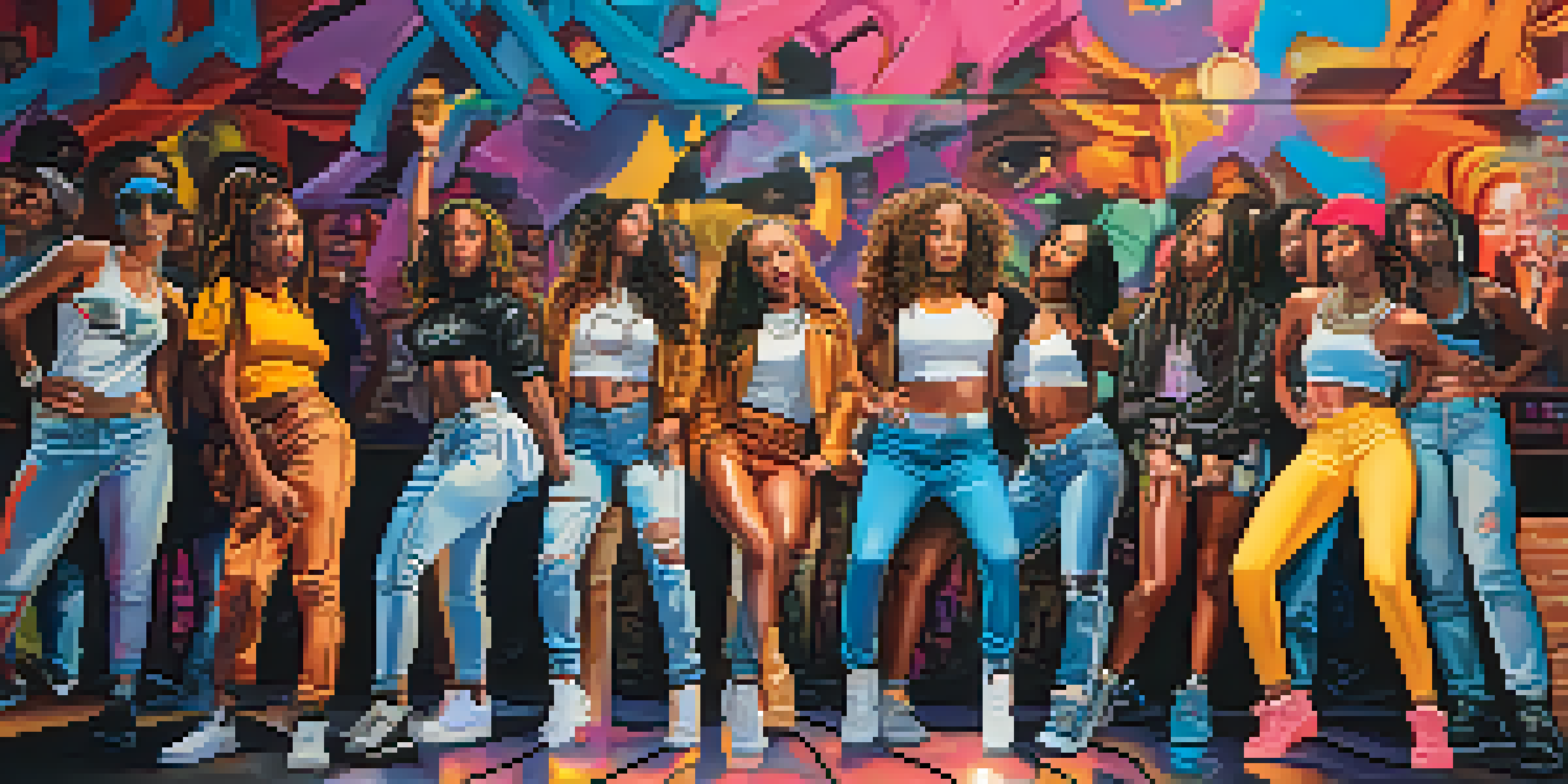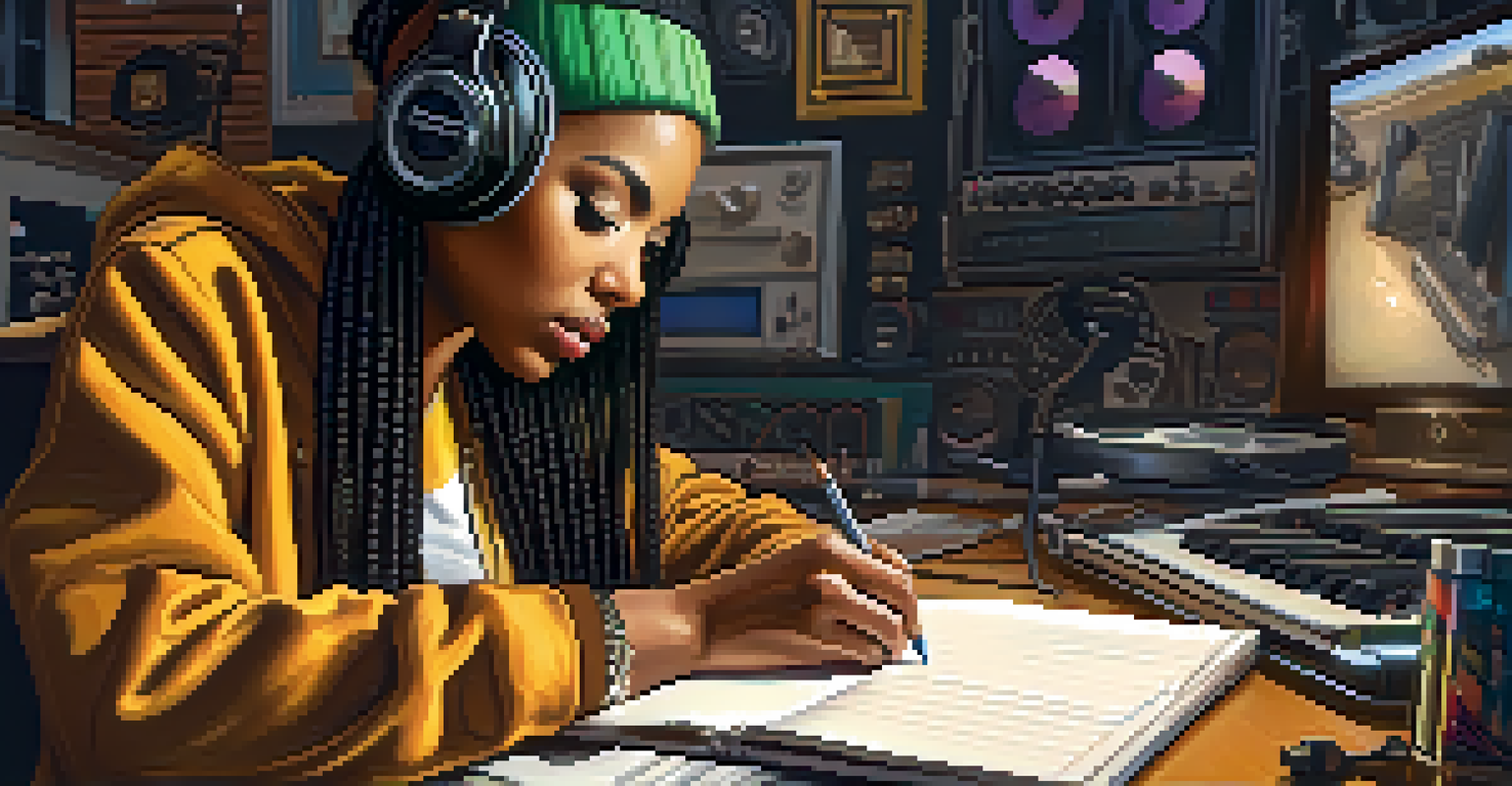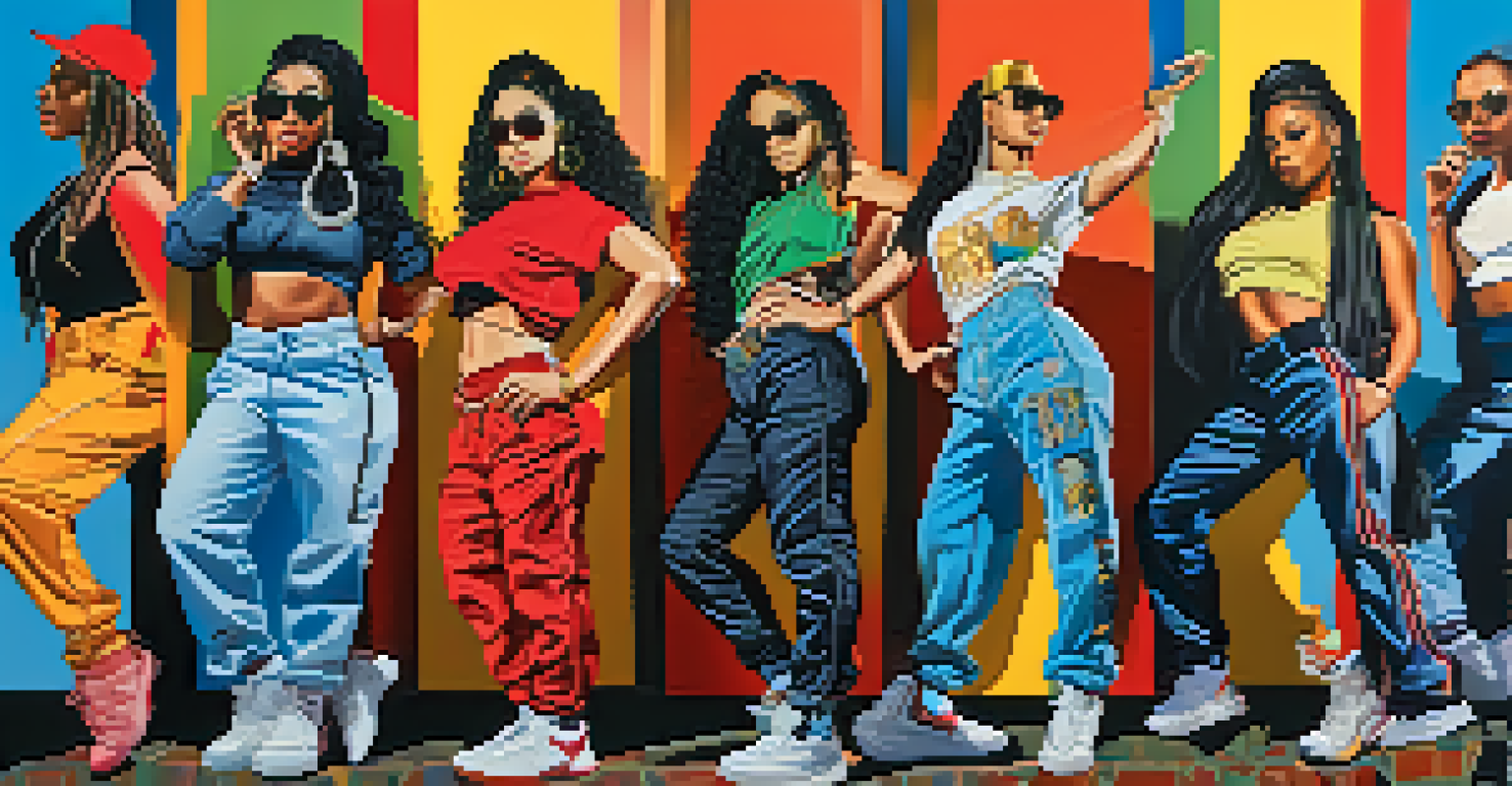Women in Hip-Hop: Breaking Stereotypes and Barriers

The Historical Context of Women in Hip-Hop
The journey of women in hip-hop begins with a rich history that often goes overlooked. In the early days of the genre, female artists like MC Lyte and Queen Latifah paved the way, proving that women could dominate the mic and tell compelling stories. Their contributions laid the foundation for future generations, highlighting a unique perspective in a male-dominated space.
The power of a woman is not in what she says, but in what she does.
Despite their groundbreaking work, women often faced significant challenges and stereotypes. The industry was rife with sexism, and many female artists struggled for recognition and respect. This historical context is crucial in understanding the resilience and determination that many women in hip-hop exhibit today.
As we delve into the evolution of women in this genre, we see a continual fight against stereotypes—where lyricism and artistry are more important than gender. This ongoing narrative showcases how female artists have not only survived but thrived, influencing culture and inspiring future musicians.
Breaking Stereotypes Through Music
One of the most powerful tools women in hip-hop use to break stereotypes is their music. Artists like Nicki Minaj and Cardi B challenge traditional gender roles by expressing their sexuality and independence unapologetically. Through their lyrics, they redefine what it means to be a female artist, showcasing strength and vulnerability in equal measure.

Moreover, their success proves that the audience is ready for diverse narratives. By embracing various themes—from empowerment to personal struggle—these artists resonate with listeners who crave authenticity. This shift not only broadens the genre’s appeal but also reinforces that women can thrive in any artistic space.
Women in Hip-Hop Break Stereotypes
Female artists challenge traditional gender roles through their music, redefining what it means to be a woman in the genre.
As more women step into the spotlight, they bring their unique experiences and perspectives, enriching the hip-hop landscape. This dynamic is essential in dismantling outdated stereotypes and fostering a more inclusive environment for all artists.
Prominent Female Figures in Modern Hip-Hop
Today, artists like Megan Thee Stallion, Doja Cat, and Rapsody are leading the charge in redefining hip-hop. Each of these women has carved out a distinct identity, using their platforms to advocate for issues such as body positivity, mental health, and social justice. Their voices are not just heard; they are celebrated, further elevating the role of women in the genre.
We need to reshape our own perception of how we view ourselves. We have to step up as women and take the lead.
Megan Thee Stallion, for example, embraces her sexuality while also promoting self-love and confidence, thus inspiring many young women. Similarly, Rapsody’s thought-provoking lyrics challenge societal norms, proving that hip-hop can be a vehicle for change. These artists exemplify the power of female representation in music.
This rise of diverse female voices is a pivotal moment for hip-hop, showing that there is space for everyone. As these artists continue to break barriers, they create a ripple effect, encouraging more women to pursue their dreams in an industry that once marginalized them.
The Impact of Social Media on Female Artists
Social media has revolutionized how artists connect with audiences, and women in hip-hop are leveraging these platforms in innovative ways. Platforms like Instagram, TikTok, and YouTube allow female artists to showcase their talents, share their stories, and build dedicated fan bases without relying solely on traditional media. This democratization of the industry empowers women to take control of their narratives.
Through social media, artists can directly engage with their fans, creating a sense of community and support. This connection fosters a space where women can uplift one another, share experiences, and collaborate creatively. Additionally, social media has become a powerful tool for activism, allowing artists to amplify their voices on pressing social issues.
Social Media Empowers Female Artists
Platforms like TikTok and Instagram allow women in hip-hop to connect directly with audiences, fostering community and activism.
As we witness the rise of viral trends and direct fan interactions, it's clear that social media is reshaping the landscape for women in hip-hop. This newfound accessibility not only enhances their visibility but also encourages a more diverse array of voices to emerge in the industry.
Challenges Faced by Women in Hip-Hop
Despite the progress made, women in hip-hop still encounter various challenges that can hinder their success. Issues such as sexism, harassment, and unequal pay remain prevalent, often creating a hostile environment. Many female artists must work twice as hard to gain the same recognition as their male counterparts, leading to fatigue and frustration.
Additionally, the pressure to conform to certain stereotypes can be daunting. Female artists are often pigeonholed into specific roles or expected to present themselves in a particular way, which can stifle creativity. This struggle highlights the need for continued advocacy and support for women in the industry.
Recognizing and addressing these challenges is essential for fostering a more equitable music landscape. By acknowledging the obstacles women face, we can work together to create a more inclusive environment where all artists can thrive.
The Role of Allyship in Hip-Hop
Allyship plays a crucial role in supporting women in hip-hop, encouraging male artists and industry professionals to advocate for gender equality. When male artists use their platforms to uplift female voices, they help challenge the status quo and promote a more inclusive culture. This collaboration can lead to more opportunities for women and a broader understanding of the genre as a whole.
Examples of successful allyship can be seen in collaborations between male and female artists. When they come together, they create powerful music that transcends traditional norms and showcases unity. This not only elevates the female artists involved but also sends a message to the industry about the importance of collaboration and respect.
Allyship is Key for Gender Equality
Collaboration between male and female artists promotes a more inclusive culture in hip-hop, enhancing opportunities for women.
By fostering an environment of support and understanding, allyship can help dismantle the barriers women face in hip-hop. As more individuals advocate for equality, the genre can evolve into a space where creativity knows no gender.
The Future of Women in Hip-Hop
Looking ahead, the future of women in hip-hop appears promising, with an ever-growing roster of talented female artists making waves. The genre is becoming increasingly receptive to diverse voices, allowing for a broader spectrum of stories and experiences. As more women break into the industry, they pave the way for future generations to follow.
Moreover, the ongoing conversations about representation and equality are fostering a culture of support and collaboration. Initiatives aimed at promoting female artists are gaining traction, helping to create a more equitable landscape in hip-hop. This shift not only benefits women but enriches the genre as a whole.

As we celebrate the achievements of women in hip-hop, we must also remain vigilant in addressing the challenges that still exist. By supporting one another and advocating for change, we can ensure that the future is not only bright for female artists but also transformative for the entire music industry.